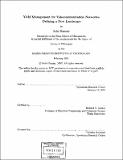Yield management for telecommunication networks : defining a new landscape
Author(s)
Humair, Salal
DownloadFull printable version (14.34Mb)
Other Contributors
Massachusetts Institute of Technology. Operations Research Center.
Advisor
Richard C. Larson.
Terms of use
Metadata
Show full item recordAbstract
Can airline Yield Management strategies be used to generate additional revenue from spare capacity in telecom networks? Pundits believe "yes", based on several analogies between the industries such as, for instance, perishable inventory and negligible marginal cost of usage. However, no one has yet described how, one of the chief difficulties being the vastly different nature of airlines products and telecom services. Motivated to show how Operations Research can play a role in structuring this area, we: (i) argue that telecom Yield Management should be based on 'innovative' services explicitly designed to use only spare capacity, (ii) propose, borrowing from airlines, a framework to simplify related decision modeling, and (iii) demonstrate both our argument and the framework by articulating several 'innovative' telecom services and modeling them to varying degrees of depth. This thesis focuses only on the decision-making that will be required within a large infrastructure for operating new 'Yield Management' services. For each service, several decision variables can be considered to maximize revenue from available capacity, e.g. pricing, capacity limits and admission control, among others. Incorporating all such decisions in a single model usually leads to complicated formulations. A framework that decouples the decisions from each other to obtain simpler, more insightful models is therefore immensely helpful. We propose using the airlines modeling framework to separate the decisions involved in the operation of each new service. This framework classifies models into forecasting, over-booking, seat-inventory control, pricing and market segmentation to reduce the complexity of the system-wide problem. To make this framework useful for telecom, we provide a detailed interpretation of each category in the telecom context. . Finally, the majority of this thesis is the six service ideas that illustrate our argument and the models that demonstrate how the framework might be used. For each service we propose, we discuss possible markets and practical issues. We then formulate a model for one of the decisions resulting from the framework. These models are analyzed to varying depths to demonstrate the operating rules one can discover for revenue maximization. The contributions of this work are at multiple levels. In addition to our argument and examples of services proposed for telecom Yield Management, it structures the modeling questions in a coherent manner, exploiting more than only the high-level connections between airlines and telecom. Finally, the models themselves are useful and their contributions are at the analytical level. This thesis makes clear several connections between airline and telecom Yield Management that people have found difficult to establish in the past.
Description
Thesis (Ph.D.)--Massachusetts Institute of Technology, Sloan School of Management, Operations Research Center, 2001. Includes bibliographical references (leaves 141-146).
Date issued
2001Department
Massachusetts Institute of Technology. Operations Research Center; Sloan School of ManagementPublisher
Massachusetts Institute of Technology
Keywords
Operations Research Center.